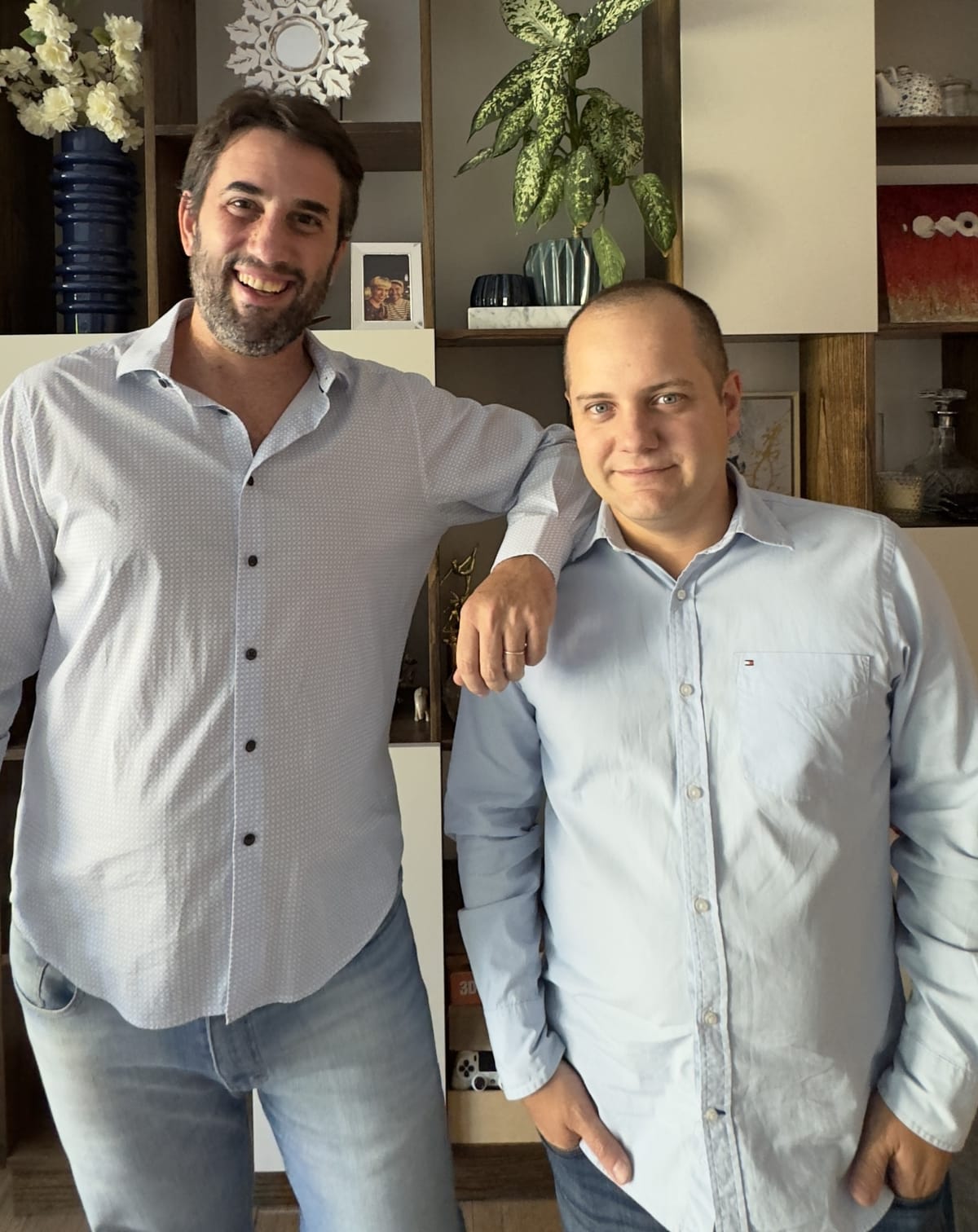Buenos Aires, Argentina
Data collection often means navigating an endless labyrinth of information, requiring careful sourcing from multiple channels. This challenge inspired an opportunity to innovate for Argentinian entrepreneurs Luciano Cohan and Miguel Ángel Saez. Together, they co-founded Alphacast, an integrated economic and financial analysis platform.
Alphacast doesn't just simplify data collection; it streamlines the entire data management experience. With the power to download, generate, and integrate data, it helps users create interactive charts, maps, insights, and engaging presentations. Born out of Luciano's previous endeavor, an economic consulting firm specializing in macroeconomic consulting, presentations, and projections, the Alphacast went through a transformative shift, ultimately becoming the full-fledged application it is today.
A shared vision
Every successful business begins with a spark of inspiration or identifying an opportunity. However, it's not always about finding a groundbreaking new idea and starting from scratch; sometimes, it's a twist or turn in an existing business or concept to propel you forward.
For Luciano and Miguel, this was precisely the case. Before Alphacast, Luciano led Seido, a macroeconomics consultancy working with banks and companies to analyze Argentina's economic scenarios. As consultancy work involves using multiple data sources, he personally experienced the problem that Alphacast solves today. "So, when we began to connect with clients and users who were asking for this solution, it felt very natural," says Luciano.
He recognized the potential of an integrated platform and decided to develop the product. Luciano, however, was not alone in this endeavor; he teamed up with Miguel, an experienced engineer who had worked in both corporate and startup technology settings. With his extensive experience in product development, Miguel deeply understood and could implement technology. Their partnership exemplifies the power of complementary skill sets, as Luciano brought a profound understanding of the business landscape and customer profiles, while Miguel possessed the technical expertise to bring their vision to life.
Their conversations began in May 2020, right in the middle of the pandemic, when they found themselves with an abundance of time and a shared enthusiasm for this potential new product. "Lucho and I started talking about the idea of doing something together around May 2020, and it was like we couldn't stop. We had endless conversations at all hours on WhatsApp, constantly sharing ideas and thinking about how to do it and [making] some decisions. That flowed very well," said Miguel.
Together, they built the first demo for the Alphacast platform in just two weeks. At the time, Miguel was CTO at an American GPS tracking and shipment management company. Driven by his engaging conversations with prospective clients and the positive reception of the demo, he was convinced they had an opportunity worth pursuing. That's when Miguel decided it was time to take the leap.
"We started talking to clients about Alphacast after the demo. We met with a potential lead who said, 'I'm waiting for you to launch this product more than I'm waiting for the COVID vaccine,' I remember. And well, a few days later, I spoke to my boss at work and transitioned to working full-time on this venture."
Alphacast was officially born in early 2021. In April of that year, Luciano and Miguel secured a funding round with angel investors, allowing for rapid team and product development.
Positioning for success
Despite the inherent risks of startup life, Luciano and Miguel recognized the growth potential and strategically positioned Alphacast to address the evolving needs of their target audience effectively.
"We are not a financial services provider or a fintech company. We are a productivity tool for teams in Economics and Finance. We saw an opportunity there. Essentially, we serve a niche market with well-established players like Bloomberg and Refinitiv. These companies have their own methods and are particularly strong in market data. However, their business model is somewhat similar to traditional news broadcasters. They generate the data, and the consumers use it. We came with a more open and modern vision, similar to Twitter in the news generation world, where users create their own content, and information is much more open and transparent. Based on this vision, we built the platform. From there, we started addressing specific data needs," Luciano explains.
"Essentially, we transformed ourselves into a kind of second-floor consultancy, where our previous business essentially became our clients. From there, we expanded, and our consulting product became an application, a tool. That was the process of a company that had been in operation for about two years at the time, and the initial product versions were already built with clients," he continues.
Luciano recognizes that Latin America, in particular, presented a significant opportunity due to its relative lack of data development and specific technology. Therefore, they initially focused on this region. Research and economic analysis teams were identified within the financial services industry as segments with great opportunity and potential: "We found a lot of untapped information areas where we are making a difference," said Luciano.
The initial product was launched into production quickly and featured limited functionalities. As the product grew, new possibilities emerged — the ability to transform data, create dashboards, integrate with AI, and handle large volumes of data. The vision continued to evolve as they got to know clients from diverse countries.
While its primary focus remains Latin America and the United States, Alphacast has been expanding its efforts to attract global clients. "From the beginning, we saw Argentina as the starting point for expansion into [LatAm]. It's a smaller and more challenging market. We already have clients in Chile, Mexico, the United States, England, and, of course, Argentina because it's our home country. But we understand that the bigger opportunities are out there in the rest of the world," says Luciano.
The product
Alphacast offers a range of powerful benefits and features designed to streamline data management and analysis.
The platform connects to over 4000 economic and financial data sets with its integration capabilities, simplifying data collection. Users can transform their data without requiring specialized programming skills, allowing them to create and share dynamic charts and dashboards, making visualization, comprehension, and communication much more straightforward. From banks to insurance companies, Alphacast's clients use the platform to automate their operations, track industries in different countries, and write reports, for example.
The company stays ahead of the curve by committing to testing, innovation, and rapid responsiveness. "We have an internal team that uses the product a lot. In technology, that's called "dogfooding," but we go beyond that; we do more like "pack-fooding." There are many features that we dare to move forward rapidly, put into production, and test, but obviously, there's always a core service that we take great care of and are much more respectful, ensuring reliability is very strong," Miguel explains.
Facing the transition
Alphacast has experienced continuous growth since its inception in 2020. However, it hasn't been without its challenges. For Miguel, one significant challenge was taking that leap of faith into the unknown. He had been working for an American company before joining Alphacast. But the vision was clear, and his determination even more potent.
Once Miguel decided to take a leap of faith, another challenge emerged —incorporating himself into an already established team with no technology department. "Initially, I sent videos to show what I was working on, and for the rest, I was just a voice in a video. Eventually, we became a team. The team grew, and we were fortunate to have angel investors come on board in 2021. They had been with us almost from day one because they decided to join us after just two months. From there until now, time has flown by as if it were just yesterday," Miguel recounts. When they first started Alphacast, they already had ten people on board; now, their team has duplicated to around 20 members.
Luciano's main challenge lay in effectively communicating the transition to clients. "There's another critical moment, it seems to me, in the startups that go from being a consultancy to becoming a product, which is the moment when you look at the clients you used to have and say, 'Look, we are no longer a consultancy, we're not going to do what we used to do anymore, and now we're going to do this, which is a product, a tool.' And everyone supported us. Achieving that transition, which, of course, is always a bit scary, thinking, 'Well, I might lose business,' and so on, flowed really smoothly, and today they continue to support us," he expresses proudly.
Alphacast, amid a critical growth phase, is currently in discussions for a funding round that will mark a significant milestone for the company. These funds will help strengthen the team, develop new products, expand their presence in key markets, and expand into new geographies. "It's a moment when we're projecting the future of our growth the most. It's because, at some point between April and winter, we launched a set of new functionalities and refined our sales approach. We're witnessing a surge in user interactions and contract closures. So, I would say we're very, very optimistic," says Luciano.
Learning through change
Luciano and Miguel stress the importance of addressing a need in the market when setting up a business. Even if your clients cannot pay initially or you cannot charge them, having someone who truly needs your offer is crucial. They consider this the foundation that enabled Alphacast to expand and establish credibility. Right from day one of their launch, they had clients and active users, which built a customer base that supported them throughout their initial phase.
"You might believe that there will be a lot of customers for that idea, but you have to find them, right? For me, that's where you should start," Miguel states.
Transparency, communication, and agility form the bedrock of Alphacast's business culture. They foster an open dialogue within their team and maintain a swift decision-making process. This culture has propelled their growth and earned them the trust and satisfaction of their clients.
"We make decisions very quickly. We don't like to over-plan and overthink things. I think that's something our clients really appreciate; they're sometimes surprised that they give us feedback on something and, within two days, they see it resolved, sometimes on the same day, even. So, in a way, that agility is something every young or small company must have. For us, it's not so much a problem as it's part of our DNA," says Miguel.
In addition to agility and a solid client base, Luciano and Miguel emphasize the importance of surrounding themselves with people who know a lot, both within the team and externally. However, this involves keeping a critical eye when making decisions, listening, being eager to learn, and engaging in introspection to discern what to take and leave behind.
"There have been many recommendations that, if we had followed them, I believe we wouldn't have fared well in some aspects due to how the market has evolved. We had a clear vision of what we wanted to do, so I think that's important. You need to have a good ear, listen to the right voices, and then know what to select from that and execute, work, and take action," Miguel notes.
Alphacast trajectory shows how, in today's fast-paced business world, the ability to adapt to a changing industry often marks the difference between success and stagnation. Startups must navigate today's complex entrepreneurial landscape by remaining flexible, strategic, and proactive. Those that fail to do so risk becoming irrelevant and losing ground to more agile competitors.
"[I believe] if something defines a startup at this moment, it's growth and change," adds Luciano.



